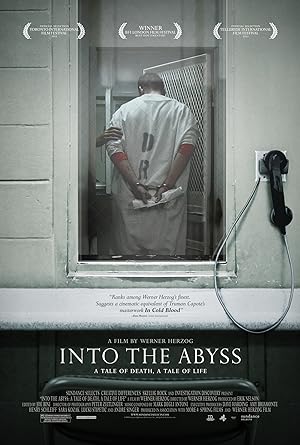Werner Herzog directed Into the Abyss: A Tale of Death, A Tale of Life, a subtitle rarely used in the marketing of the documentary. It focuses on a crime that occurred in Conroe, Texas, but is not just about the people involved, i.e. the victims or the perpetrators, but the community that were a part of their lives. Unlike any other true crime documentary, Herzog focuses on the socioeconomic and psychological factors that contributed to the circumstances that led up to this crime.
Into the Abyss is divided into six parts: The Crime, The Dark Side of Conroe, Time and Emptiness, A Glimmer of Hope, The Protocol of Death and Epilogue: The Urgency of Life. The film is one hour forty-seven minutes long. While I love Herzog’s documentaries, I was less engaged in it than I thought that I would be. I think that I find Herzog films so fascinating because he focuses on subjects that are unfamiliar to me whereas it seemed apparent that he was not familiar with this segment of the population, but I was though not specifically the residents of Conroe. On one hand, this approach can provide a refreshing perspective that humanizes and sympathizes the perpetrators instead of being dismissive of them. On the other hand, if you are familiar with this segment of the population, it can be frustrating that he does not dig a little deeper when details get vague or are withheld.
For example, Herzog congratulates a man for learning how to read as an adult and takes a beat to really appreciate the moment. He is completely right that it is an impressive accomplishment and a horrible indictment of how the education system in that part of the state failed these men long before they became criminals if one can infer and extrapolate from this associate’s experience that it did not give them the basic tools to navigate the world successfully. The same man casually offers that he got stabbed with a screwdriver and lived. Herzog just lets that go. Violence seems very casual like a footnote even for the victims in that area. Why didn’t he dig deeper? He is close to painting a complete picture of their world, but repeatedly pulls back out of a sense of decorum or a mistaken belief that screwdriver attacks are just a part of life. The victims seem to have repeatedly been struck by tragedy, but he just stands at the threshold. Is this systematic of Conroe or just the usual cross section of humanity in all its glory? The wife of one of the perpetrators got pregnant though there are no conjugal visits. I’m sorry, but if you open the door, I’m walking in. None of these tertiary vignettes are directly relevant to the central story and characters, but if we have to go there, then let’s go there.
Apparently Into the Abyss had an anti-death penalty agenda, which I was unaware of while watching it, but in retrospect, it makes sense considering that as bookends, the documentary features interviews with people who are or were a part of the process who sound as if their experience is or has persuaded them to the other side. I’m pro-death penalty with caveats regarding the inequities in our administration and execution of justice, but I’d like to think that I could be persuaded so I actually appreciated this anecdotal, but expert experiential perspective. Herzog’s documentary is definitely not a preach to the choir film, and it has persuasive moments, but if he was aiming to close the deal, then it definitely fails because it seemed incidental instead of the mission statement. To accomplish that goal, maybe Herzog should have made a documentary about all the people in Texas who work in some capacity with death row inmates. I know that it is a callous perspective, but Jason Burkett and Michael Perry competing to throw the other under the bus and deny culpability isn’t going to convince me that the death penalty is wrong no matter how sad their childhood was.
Yes, there is something galling that the system is less invested in insuring that everyone lives their best lives in spite of the Declaration of Independence, but are more dependable when it comes to punishment except when the bureaucracy messes up. Bureaucracy and institutions are held to a lower standard than individuals; however that disparity is not exculpatory. Tell me the Menendez brothers’ story where the victims actively destroyed their life, I would lean to not guilty or a minimal sentence, but these guys? Nope. I’m not Jesus. I wasn’t haunted by Perry’s death, and if I was supposed to, then Herzog failed. Making people who aren’t murderers into murderers albeit legal, state sanctioned ones is inherently problematic and is worth exploring. The idea that more lives can get lost than the perpetrators is a haunting concept.
Into the Abyss is a must see for Herzog fans or anyone interested in true crime stories, but find most takes too lurid, sensational or distasteful and are looking for more elevated fare. If you’re similar to me in sensibilities, you may get bored or frustrated when Herzog abandons threads dangled before him instead of plunging through. His documentaries usually feel comprehensive. This film feels rambling and has an unfinished quality, which may have been an intentional feeling that he evoked. At any rate, it leaves us with a message that is applicable to everyone. “Live your dash,” i.e. the dash that is in between your birth and death date on your tombstone, but perhaps it needs one more word, “Live your dash well.”
Stay In The Know
Join my mailing list to get updates about recent reviews, upcoming speaking engagements, and film news.




